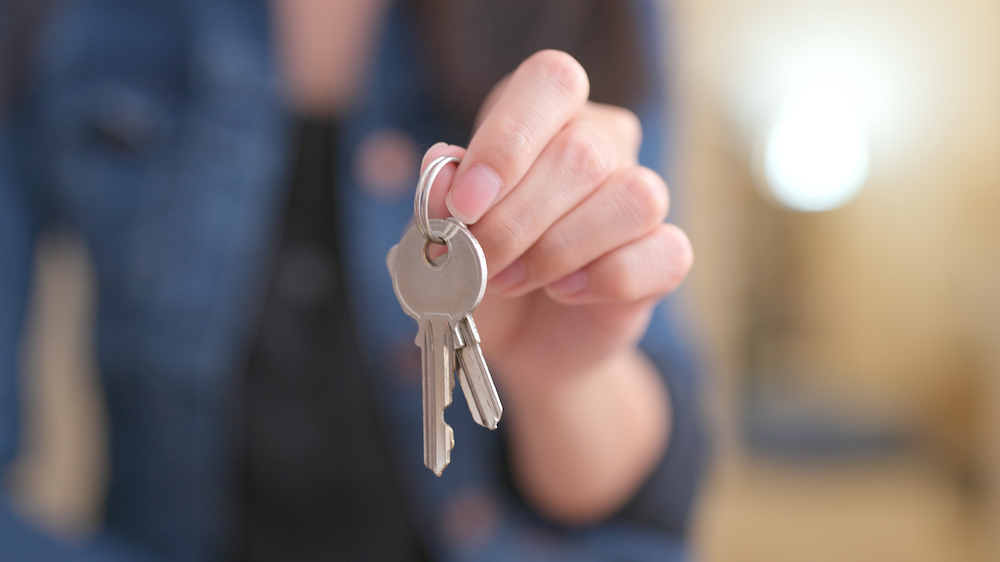
Mortgage Rates Pennsylvania: Which Loan Type Is The Best For Me?
(insert personalized rate tool here)
Median home values in Pennsylvania are relatively lower than the national averages – that means becoming a homeowner in the state is more affordable than ever before. However, lower housing prices lead to higher demand and a competitive housing market.
Knowing the latest mortgage rates can boost your odds of getting an affordable home in the state. This guide covers everything you need to know about mortgage rates in Pennsylvania.
Read on to find the most current Pennsylvania mortgage rates and learn all about the state’s homebuyer assistance programs!

Home Loan Options In Pennsylvania
There are three main mortgage types you can choose from. It’s important to understand each type since they have unique features. Our breakdown below should help you choose the one that best fits your needs and financial circumstances.
Conventional Home Loan
Any loans not offered by the government fall into the category of conventional loans. These loans have loan amount limits that vary by area. For the majority of Pennsylvania, conforming loan amount limits are set at $548,250. The exception is Pike County, where loan limits are set at $822,375.
Conventional loans are further broken down into three loan types, each with its pros and cons:
Fixed-Rate Mortgage
A fixed-rate mortgage has a stable interest and annual percentage rate. These static rates translate into a constant monthly payment amount for the entire life of the loan.
Because of their stability, these home loans are popular with first-time homebuyers. However, fixed mortgages tend to have higher rates compared to other loan types.
People most commonly take 30-year fixed loan terms because they offer the most affordable monthly payments. If you want lower interest rates, you can take 15-year or 20-year loan terms – with the caveat of a higher monthly payment amount.
Adjustable-Rate Mortgage (ARM)
Adjustable-rate mortgages have interest rates that adjust annually according to a market index. These interest and annual percentage rate adjustments cause your monthly payment amounts to fluctuate every year.
However, ARMs also have an introductory period with fixed interest rates. These introductory rates are usually lower than fixed-rate mortgages, making ARMs popular for short-term savings.
The length of an ARM’s introductory period lasts anywhere from 3 to 10 years and is usually written in its name. For instance, a 5/1 ARM has a five-year introductory period.
Jumbo Mortgage
Jumbo loans provide borrowers with a mortgage that can exceed the conforming loan limit. These loans can help borrowers buy more expensive homes, although they come at higher rates.
Government-Backed Loan Programs
The federal government backs three major loan programs to boost the homeownership rate among select demographics, like low-income borrowers and military veterans.
The three government loan types are:
- FHA loans: These loans, geared toward lower-income homebuyers, offer a competitive rate and lower monthly payments. This is balanced out by a lower purchase limit and mandatory mortgage insurance (MI) fees for the entire loan.
- USDA loans: These rural development loans have strict area requirements, meaning you can only buy homes in eligible areas. The upside of this loan is that you have zero down payment requirements and reduced mortgage insurance premiums.
- VA loans: You can qualify for these home loans if you’re an active or former military servicemember. This zero-down loan comes with a VA funding fee worth 2.3% of your loan, but you can put more money down to lower the fee.
Mortgage Refinancing
Refinancing entails taking out a new mortgage to pay off your existing one. There are two types of refinances that accomplish different goals:
- Rate and term refinance: This type of refi lets you alter your loan details by changing its period or type. You can shorten or lengthen your loans as well as change your fixed-rate loan into an ARM or vice versa.
- Cash-out refinance: Cash-out refis turn your home equity into cash by providing you a loan that’s larger than your current mortgage balance. Once your mortgage is paid off, you can use the leftover money for other needs.
Compare Mortgage Rates In Pennsylvania
Historically, mortgage rates in Pennsylvania have been slightly higher than the national average mortgage rates. Check the table below for the most current Pennsylvania mortgage and refinance rates. All mortgage rate information listed here is taken from America’s major mortgage lenders.
Today’s Mortgage Rates in Pennsylvania
(insert rate table here)
All listed mortgage and refinance rates are subject to change without prior notice. Your actual mortgage rate may vary depending on your financial condition.
Input your financial details into the mortgage calculator above this page for a personalized Pennsylvania mortgage rate estimate.

First-Time Homebuyer Programs In Pennsylvania
You can take advantage of Pennsylvania’s mortgage and down payment assistance programs to get better home deals. Pennsylvania Housing Finance Agency (PHFA) sponsors three main programs:
HFA Preferred (Lo MI)
The HFA Preferred loan’s main benefit is low MI fees and no price limits on a primary residence purchase. This program is open to new and recurring home buyers.
To qualify for this program, you need to fulfill the following criteria:
- Have an annual income that falls under area limits
- Contribute at least $1,000 to your down payment
- Complete a homebuyer education course
Keystone Home
PHFA’s second program is aimed at first-time homebuyers and homebuyers. The Keystone Home loan offers conventional, FHA, VA, and USDA with competitive rates and fewer fees.
If you’re looking to qualify for this loan, you need to meet the program’s household income and purchase price limits – both of which vary by county.
Keystone Government Loan (K-Gov)
The PHFA helps connect lenders and brokers with first-time and repeat homebuyers looking for government-backed mortgages. Since PHFA only connects borrowers and lenders, all traditional FHA, USDA, and VA loan requirements still apply.
Keystone Advantage Assistance
If you’re participating in any PHFA program, you can apply for its down payment and closing cost assistance. If you qualify, you can receive an interest-free 10-year loan worth up to 4% of your purchase price.
To be eligible for this loan, you must fulfill these requirements:
- Have a credit score of at least 660
- Use the provided funds to pay your down payment and closing costs
- Have less than $50,000 in liquid assets after loan closing
Buying A Home In Pennsylvania
Because even small mistakes can cost you a lot of money, buying a home can be a daunting prospect. However, that doesn’t need to be the case. Follow these six steps to avoid missteps and buy a home with confidence!
Step 1: Get A Pre-Approval Letter
Most sellers won’t consider your offer if you don’t have a pre-approval letter first. To get one, you need to begin a mortgage process and pass the lender’s credit checks.
Your pre-approval letter will contain key details of your loan, like its interest rate and maximum amount. Your pre-approval letter serves as a sign of financial readiness to buy property and a budget guide for your house hunt.
Step 2: Look For Real Estate Agents
The next important step is to find a real estate agent well-versed in the area. They can help you secure the best home deals and provide key details about your chosen neighborhood. Pay close attention to their experience and review scores when filtering through candidates.
Step 3: Start House Hunting
Start your hunt from the neighborhood level. Pick a neighborhood that fits your budget, then search local listings for the most affordable homes.
If there are no affordable homes that fit your needs, consider buying a fixer-upper. You can use the money you saved by buying a cheaper home to pay for home improvements.
Step 4: Make A Bid On A Home
Since Pennsylvania is a seller’s market, you’re likely to encounter competition from other buyers. Catch the seller’s eye by making an offer above the listed property value. However, make sure to consult your realtor before doing so to avoid overpaying.
Step 5: Schedule Inspections & Appraisals
Hiring home inspectors and appraisers is part of the post-purchase due diligence. These experts can pinpoint property defects and determine the actual value of the home. If you think the home is overvalued or will cost significantly more in repairs, you can try to renegotiate a better deal with the seller.
Step 6: Close The Deal
Before closing day rolls around, prepare the money to pay your origination fees. Have your realtor present during paperwork signing to answer any questions you may have before finalizing the purchase.

How To Get Better Pennsylvania Mortgage Rates
Reducing your mortgage rate by a few points may not look like a large saving now, but the reduced interest payments will add up and you can save thousands in the long term. Drive down your mortgage rates using these tips!
Compare Offers From Multiple Lenders
Mortgage companies will try to entice you with lower rates or discounted lender fees. This is why comparing different loan offers is the key to finding the best mortgage deal for you.
Shop around so you can find deals that you might not have otherwise found. Ask for standardized loan documents, then choose the one that allows you to save the most money.
Provide Larger Down Payments
Paying more down helps reduce your mortgage balance – increasing your loan-to-value ratio and potentially driving your rates down. Providing over 20% down also allows you to lower other costs as you no longer have to pay MI.
Consider Buying Mortgage Points
Mortgage points drive your rates down. Each point is usually worth 1% of your loan and offers a 0.25% rate reduction. However, these points only apply to your current mortgage, so you should only buy points if you’re not planning to refinance in the near future.
Additional Rate Reduction Tips
Alongside the three aforementioned tips, there are additional steps you can take to drive your rates down:
- Apply for a shorter loan term.
- Increase your credit score.
- Seek advice from independent mortgage brokers.
Closing Thoughts
Pennsylvania’s low median home value leads to high housing demand. Knowing the local mortgage rates and understanding the home buying process can help you land a dream home in the Keystone State.
If you’re looking for the best housing and mortgage deals in the state, Wesley LLC is here for you. Contact our team today to schedule a mortgage consultation!